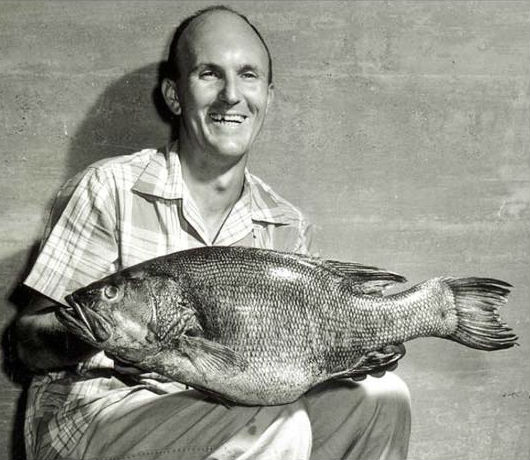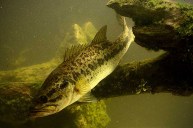These fish were all disqualified from the record books.
Everyone loves to see a fishing record fall. It is always a memorable event when someone finally snags the "big one" that breaks a long-standing record.
But sometimes things aren't always what they seem. Sometimes things happen either in or out of the angler's control that turn a great catch into a total headache.
The stories here fall into the latter description.
The five fish here all either were or had a real shot at being in the record books before being disqualified.
1. The Paul Crowder Bass, Arkansas
In March of 2012, Arkansas anglers were abuzz at the news of a 16-pound, 5-ounce largemouth bass taken from Lake Dunn by a man named Paul Crowder. The big fish just barely eclipsed the state record largemouth bass. It was a bigger fish by just a single ounce.
But there was one problem. In the course of verifying the new record, the Arkansas Game and Fish Commission discovered Crowder's fishing license had been purchased hours after he'd claimed to have caught the new state record. This immediately made the catch illegal.
What's more, officials then hit Crowder with charges for fishing without a license. While he told authorities he didn't set out to fishing without a license intentionally, that doesn't matter in the eyes of the law, nor the record books. So not only did he miss out on the record bass, but he was also hit with fines for catching one of the biggest bass in Arkansas' history.
2. Rob Scott, Lake Trout, Ontario
When you're fishing, you want to be careful what fish you choose to keep. Because you never know what may bite later in the day. That was definitely the case here. Rob Scott was ice fishing with a tip-up when he caught a massive 52-pound, 3-ounce lake trout.
This fish would have shattered the world record for a tip-up caught trout by almost 20 pounds. But just like the Crowder bass, there was a legality problem.
First, rules are tricky on Lac la Croix where he caught the fish. Mostly because the lake straddles the line between Minnesota and Ontario, Canada. On the Canada side, one is limited to one lake trout per day. On the Minnesota side, anglers are allowed two.
In this case, Scott was fishing on the Canadian side of the line and before he caught the record fish, an Ontario Ministry of Natural Resources officer checked his fishing license. That same officer noted Scott already had his limit with a four-pound trout he had laying on the ice. It wasn't illegal for him to keep fishing, but it was definitely illegal to keep the massive trout he caught later.
When the same officer later learned about the record catch, well, Scott's story quickly fell apart and he confessed to giving his four-pound trout to another angler to make his catch seem legit. The fish was confiscated and denied world record status. Scott later pleaded guilty to the crime and paid $475 in fines and court costs.
The sad thing is, had Scott been just 100 feet away across the line in Minnesota, the catch would have been perfectly legal.
3. Art Lawson, Muskie, New York
No other International Game Fish Association has ever been more hotly debated than the all-tackle world record muskellunge. There are no less than three alleged world-record fish that are hotly debated in muskie fishing circles as being the rightful owner of said record.
But we'll focus just on the Art Lawton muskie, which was allegedly taken on the St. Lawrence River in New York in 1969. It was claimed this fish weighed a whopping 69 pounds, 15 ounces. At the time, Field & Stream magazine kept the records for freshwater fishing, and they required a lot less proof than what is required now. Basically, all he had to do was submit the measurements and weight of the fish.
Lawton died in the 70s, but the fish stayed atop IGFA records until 1991. This was when suspicions on a photo of the record fish first emerged. Detailed photo analysis seemed to indicate the fish was nowhere near the 64 ½ inch length Lawton claimed. In fact, it seemed the fish didn't even hit the magical 60-inch mark.
During the investigation of the muskie, a previously unknown photo of the alleged record fish also surfaced. This one had a caption indicating a weight of 49.5 pounds. What was more, interviews with some of the remaining witnesses, including Lawton's own family, didn't seem to back the near 70-pound muskie story either.
This was all too much evidence for the IGFA and Freshwater Fishing Hall of Fame and in 1992 they struck the Lawton muskie from the record books forever. The case is probably also why IGFA standards are so stringent on documentation of record catches today.
4. Rodney Ply, Striped Bass, Arkansas
Some bad luck and a debatable IGFA ruling not only cost Rodney Ply a state a world record, but $1.1 million in prize money as well!
In 2012, Mustad Hooks held a "Hook-a-Million" contest where anglers could earn a cool $100,000 for landing a state record fish on a Mustad hook or $1 million for a world record. Ply was a Mustad fan and eagerly signed up for the contest, not realizing what a headache it would be later. On February 18, 2012 while fishing Bull Shoals Lake in Arkansas, Ply landed a massive striped bass that topped out an uncertified marina scale at 68 pounds, more than four pounds heavier than the world record.
That weight was enough to beat both a state and world record for a land-locked striper. There was just one problem. It took Ply, an Arkansas Game Warden, and his buddies eight hours to track down a certified scale that was large enough to handle the fish. By that time the fish had lost a ton of weight and only weighed 58 pounds, 3 ounces.
Ply thought he had a chance of getting the record anyway after tests on the marina scale showed it to be accurate. He also had witnesses to testify to the fish's weight. But then IGFA hit him with another gut-punch. They ruled the homemade lure Ply caught the fish on was an illegal spreader bar arrangement and the fish was disqualified from entry altogether.
More salt in the wound came for Ply when the $1 million prize later went to a different lucky angler. Ply ended up suing the IGFA over the whole fiasco, although we haven't heard how it turned out for either side. One thing is for certain, it had to be frustrating for all parties involved.
5. David Hayes, Smallmouth Bass, Tennessee
The David Hayes smallmouth bass world record is a fascinating case of a fish that was disqualified from the IGFA record books and then re-instated just three years later.
Hayes landed the monster smallmouth from big bass factory Dale Hollow Lake in 1978 and the 11-pound, 15-ounce fish stood without much question until 1995. That was the year that an old affidavit surfaced that claimed the Hayes fish "only" weighed 8 pounds, 15 ounces. A local guide named John Barlow claimed to have then stuffed three pounds worth of weight into the fish's gut. Hayes was allegedly unaware of the tampering the whole time. Barlow even passed a lie detector test when questioned about the incident. With this new evidence, the IGFA disqualified the Hayes bass in 1996.
But something didn't add up about Barlow's story. The Hayes bass just didn't look like a smaller fish. Critics quickly pointed out how the fish's length and girth were consistent with a 12-pound fish. Further investigation found a witness who said Barlow wasn't even at Cedar Hill Resort, the place where the fish was weighed, on the day Hayes caught it.
The investigation even found Barlow and the other men involved with the affidavit all had a bone to pick with Cedar Hill Resort. Most of the other men allegedly involved had passed by the time the claims against the Hayes bass were made. The kicker came in 1998 when Barlow's brother made a deathbed confession that Barlow's story was a fabrication and the fish was real.
A lack of eyewitnesses and other contrary evidence to the Barlow and affidavit claims led the IGFA to re-instate the Hayes smallmouth as the rightful world record in 1999.
NEXT: 4 FISH THAT CONTROVERSIALLY MISSED OUT ON BEING THE NEW WORLD RECORD BASS
WATCH









